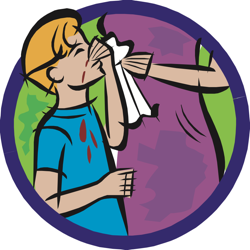bleed If a person’s skin is cut into or punctured deeply enough, blood comes out from the cut. The flow of blood is described by the verb "bleed." | simple | past | past participle |
|---|
bleed | bled | bled |
- Wendy cut her hand and it started to bleed.
- If you are bleeding from a cut, you should put a band-aid on it.
- I’m bleeding. I need a band-aid.
- A man was hurt in a serious accident and bled to death before help arrived.
- You can apply pressure to a deep cut to help stop the bleeding. (This sentence uses "bleeding" as a gerund.)
- Oscar’s nose bleeds very easily.
 His nose is bleeding. His nose is bleeding.
The word "bleed" is a noun when it’s used with the word "nose." (This forms a compound noun.) - Some people suffer from nosebleeds in the winter because the air is so dry.
- Julian has a nosebleed, but he can stop it by pinching his nostrils together.
- Normally, a nosebleed doesn’t hurt.
The word "blood" is noun. - Blood dripped onto the floor when Vanessa cut herself.
- There’s blood coming from Ron’s knee because he fell and scraped it on the pavement.
- He has a bloody knee. (The word "bloody" is an adjective.)
Click here to go to the Word of the Day page. November 2, 2015 |  His nose is bleeding.
His nose is bleeding.